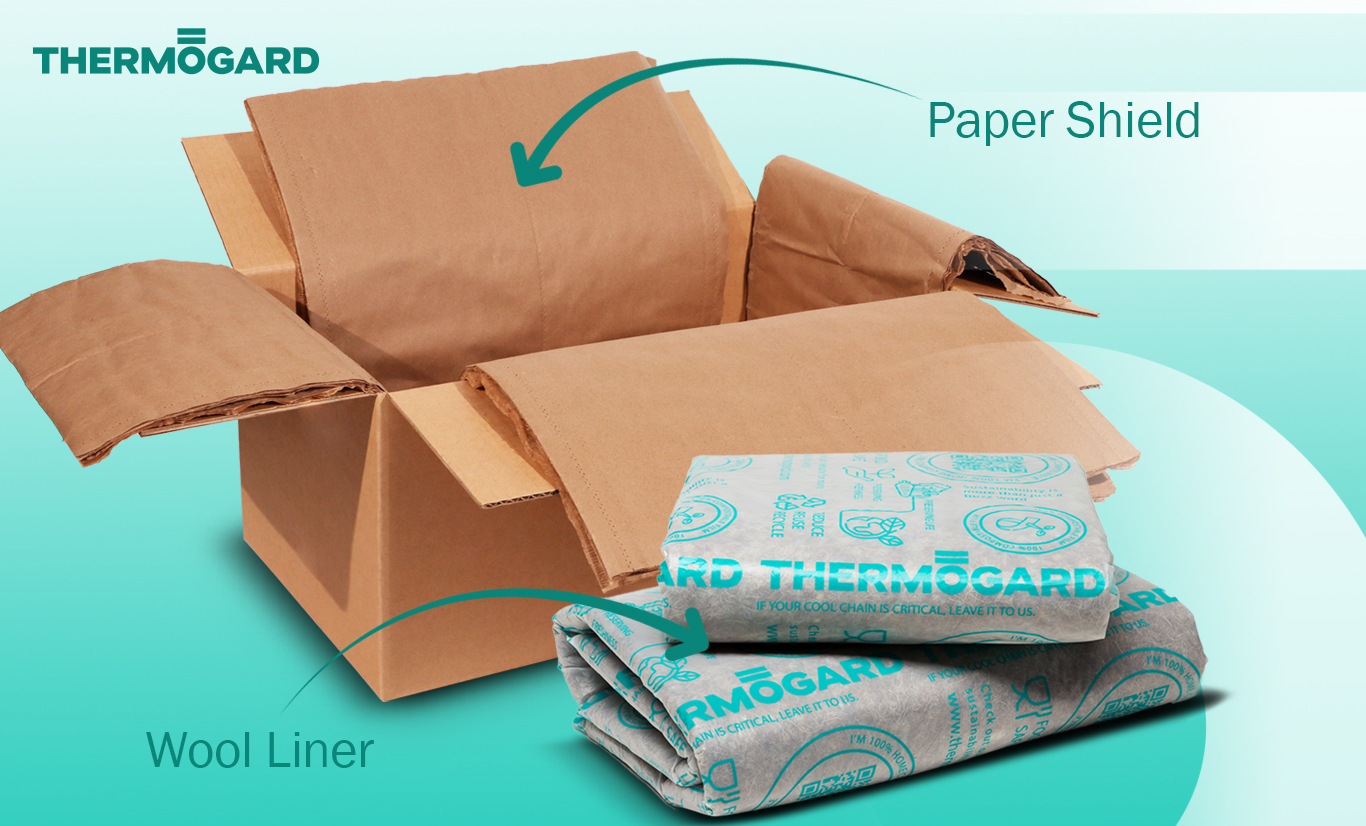Comparing Sustainable Insulation – Wool v PaperShield

With a variety of sustainable alternatives arising out of consumer demand, it can be difficult to pinpoint which best suits both your specific sustainability goals and business needs. To help you make the best decision, this blog compares two of our “sustainable” insulation products – Wool and PaperShield liners, across factors of performance, sustainability and disposal, to help you conclude on what insulation fulfils your consumers wants for sustainability, whilst remaining viable in your cool-chain.
Performance & Characteristics
PaperShield Liners
PaperShield, the latest release for Thermogard, is proving to be a popular product due to it’s easy disposal, low cost, and wide applicability. With it’s simplicity, comes true sustainability. PaperShield consists of multiple thin layers of tissue paper, backed by one thicker kraft paper layer, combining to create an efficient insulator. It’s thin nature lends well to those trying to optimise space and weight in their current pack-out, without sacrificing performance. PaperShield performs well for those in the home delivery industry, as being lightweight, single use and low cost appeals to this sector. However, PaperShield has it’s thermal limits, and cannot perform to the strict temperature parameters Pharmaceutical companies require, whereas Wool can.
Wool Liners
A Thermogard staple, Wool Liners have held the sustainable spotlight and dominated the cool-chain industry as the “sustainable” alternative. Performing as well as or exceeding it’s polystyrene counterpart, has made Wool a real contender in the industry, as it boasts high performance without the environmental impact. Hydroscopic in nature, Wool is an excellent insulator that is made from a waste product, however can be a bulky, unfamiliar item to add to your pack-out. Wool, although outperforming PaperShield thermally, has less package and consumer friendly characteristics in it’s construction.
Sustainability
PaperShield Liners
From a societal perspective, PaperShield is highly sustainable. Easy to dispose of, PaperShield is a 100% paper solution that can be recycled, composted or left to biodegrade in your garden. Paper has a positive public perception, and is widely understood to be a highly “sustainable material”. Economically speaking, PaperShield is a sustainable option as it is low-cost, and able to be used in multiple different configurations, to suit a variety of product and box sizes, saving you weight, space, and budget. Lastly, by environmental standards, PaperShield again ticks the sustainability box. PaperShield is sourced sustainably and FSC certified, meaning the creation of PaperShield does have any negative implications on the environment. Additionally, PaperShield is truly single use, as no matter where it ends up, PaperShield’s end of life process is quick and will not impact the environment negatively due to it’s biodegradable characteristics.
Wool Liners
With the understanding that the wool felt inner utilizes waste wool, and fertilizes soil when composted, Wool Liners are both sourced sustainability and at their end of life benefits the environment. However, the plastic film, although compostable or recyclable, can hinder the positive perception of the Wool Liner, due to possible confusion amongst customers. Economically, the reusing of Wool further promotes it’s sustainability, as PaperShield cannot be. Wool, wrapped in the soft plastics film, can be sanitized, and reused time and time again, making for a lower cost. True environmental sustainability of Wool Liners largely lies with the understanding of the material – if stripped correctly of it’s film, and composted, the Wool Liner has little environmental impact. If not, the inner will still decompose in landfill, but at a much slower rate then PaperShield due to it’s casing.
Disposal
PaperShield Liners
Designed to be a truly single-use insulation solution, disposal of PaperShield has no negative impact on our environment. No matter where PaperShield ends up, it’s paper construction means it will easily and quickly biodegrade without leaking any toxins into the earth or waterways. PaperShield is a foolproof packaging choice, as , as customers have complete peace of mind regarding that no matter how they disposal of your cool-chain packaging, they will not contribute to growing environmental problems.
Wool Liners
Wool, encased in compostable film, has an easy one-step disposal, like PaperShield, as the whole liner can be added to your bin or compost. However, MDPE Wool Liners require the customer to separate the soft plastics film from it’s inner, and recycle this at the nearest supermarket or recycling depot. Both recyclable and compostable, the environmental impact of the disposal of Thermogard Wool Liners is low, but is dependent on correct disposal.
Conclusion
In conclusion, in terms of sustainability, both Wool and PaperShield are improvements on other insulation options currently in the industry. However, in terms of well-rounded sustainability and applicability, many favour PaperShield over Wool. Single use, lightweight construction, and easy disposal of characteristics all lend themselves to making PaperShield the future of achievable sustainable insulation in your pack-out.
